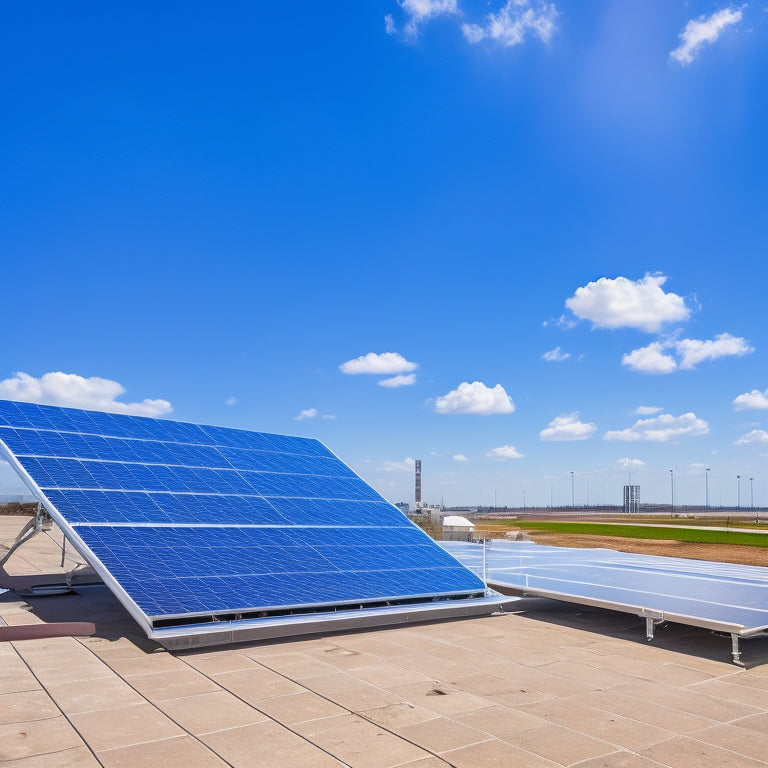
10 Essential Tips for Buying Commercial Solar Kits Online
Share
When buying commercial solar kits online, you'll want to prioritize quality, compatibility, and value for money. Research established manufacturers, understanding your energy requirements and load size, and calculate daily energy usage and peak sun hours. Verify certifications, compliance, and quality standards for solar panels, and evaluate kit compatibility and flexibility. Compare prices, considering wattage, voltage, and efficiency, and guarantee reliable customer support and warranty availability. Don't forget to scrutinize product reviews, credentials, and retailer reputation. As you weigh your options, keep in mind that a well-informed decision can make all the difference - and there's more to explore ahead.
Key Takeaways
• Determine your energy needs by calculating daily energy usage and peak sun hours to ensure the right-sized commercial solar kit.
• Verify certifications and compliance with industry standards (UL, IEC, CE, NEC) for high-quality solar panels and components.
• Evaluate kit compatibility and flexibility to ensure seamless system integration, load management, and inverter compatibility.
• Research reputable online retailers with a history of certifications, awards, and positive reviews to ensure reliable customer support.
• Compare prices and value for money by checking price transparency, component quality, wattage, and efficiency to ensure fair pricing.
Researching Commercial Solar Kit Options
When shopping for commercial solar kits online, start by delving into the specifications of various options to determine which ones align with your energy needs and budget. With the market trends shifting towards renewable energy, you'll find numerous options available. However, it's important to separate the wheat from the chaff.
Look for industry insights and reviews from reputable sources to narrow down your options. Consider the wattage, voltage, and ampere ratings of each kit to make sure they meet your energy requirements. Additionally, check the durability and quality of the components, including the solar panels, inverters, and mounting systems.
Be cautious of extremely low prices, as they might indicate low-quality components or incomplete kits. Instead, prioritize kits from established manufacturers with a proven track record of delivering high-quality products. By doing your due diligence, you'll be able to make an informed decision and invest in a commercial solar kit that meets your needs and provides a safe and reliable source of energy.
Understanding Your Energy Requirements
When buying a commercial solar kit online, you need to determine how much energy you require to power your business operations. To do this, you'll need to assess your energy needs by identifying the total wattage of the appliances and devices you plan to power.
This will help you determine your load size, which is critical in selecting the right solar kit for your commercial needs.
Assess Your Energy Needs
To determine the right commercial solar kit for your business, you need to accurately calculate your energy requirements, taking into account your daily energy usage patterns and peak sun hours in your area. Evaluating your energy needs is essential to make sure you get a solar kit that meets your business's energy demands.
Conducting an energy audit is an important step in this process. An energy audit helps you identify areas of energy inefficiency and opportunities for improvement. It also provides a detailed breakdown of your energy usage patterns, which is vital for determining the right solar kit size.
Energy mapping is another crucial aspect of evaluating your energy needs. It involves creating a visual representation of your energy usage patterns, highlighting peak usage periods and identifying opportunities for energy savings. By combining energy audits and energy mapping, you'll gain a thorough understanding of your energy requirements, enabling you to select a commercial solar kit that meets your business's unique energy needs.
This ensures you get the most out of your solar investment, reducing your energy costs and carbon footprint.
Determine Your Load Size
You'll need to calculate your total connected load size by identifying the total wattage of all electrical devices and systems that will be powered by your commercial solar kit. This is essential to make sure your solar kit can handle the energy demands of your business.
To determine your load size, you can use a Load Calculator or conduct an Energy Audit to identify areas of energy inefficiency. Make a list of all the devices and systems you want to power, including lighting, HVAC, computers, and refrigeration units. Note the wattage of each device, and add them up to get your total connected load.
Be sure to also consider the peak load, which is the maximum amount of power required at any given time. Accurately calculating your load size will help you choose a commercial solar kit that meets your energy needs, ensuring a safe and reliable power supply.
Checking Solar Panel Quality Standards
When purchasing commercial solar kits online, you'll want to verify that the solar panels meet rigorous quality standards. You should look for certifications from reputable organizations, such as UL or IEC, which guarantee compliance with industry benchmarks.
Additionally, you'll need to investigate the materials and durability of the panels to confirm they can withstand environmental stresses and provide long-term performance.
Certification and Compliance
Certifications and compliance marks on commercial solar kits indicate that the manufacturer has followed rigorous quality standards, guaranteeing your investment meets industry benchmarks for performance and safety. When buying online, it's vital to look for certifications from reputable organizations, such as UL (Underwriters Laboratories) or ETL (Intertek), which verify that the product meets industry standards.
Here are some key certifications and compliance marks to look for:
-
UL Certification: Guarantees the product meets safety standards for the US and Canada.
-
IEC Certification: Verifies compliance with international standards for safety and performance.
-
CE Marking: Indicates compliance with European Union's health, safety, and environmental standards.
- NEC Compliance: Ensures the system meets the National Electric Code standards for electrical safety.
Materials and Durability
Commercial solar kits' durability and performance hinge on the quality of their materials, so it's crucial to carefully examine the solar panel quality standards before making a purchase online. You don't want to invest in a kit that will deteriorate quickly, compromising your return on investment.
When evaluating materials, take into account the frame design and panel finish. A sturdy frame guarantees the panels can withstand harsh weather conditions, while a durable finish protects the panels from corrosion and degradation.
Here's a checklist to keep in mind:
| Material Aspect | Desirable Features |
| Frame design | Anodized aluminum or stainless steel for corrosion resistance |
| Panel finish | Tempered glass or high-efficiency glass with anti-reflective coating |
| Backsheet material | Fluorinated polymer or polyvinyl fluoride for durability |
| Junction box | IP67 or higher rating for water and dust resistance |
| Connectors | Waterproof and UV-resistant connectors for secure connections |
Evaluating Kit Compatibility and Flexibility
You'll need to confirm that the commercial solar kit you're eyeing is important with your existing infrastructure and can adapt to your specific energy needs. This is essential to guarantee a seamless system integration and efficient load management. A mismatch can lead to reduced performance, safety hazards, or even system failure.
To guarantee compatibility and flexibility, consider the following:
-
System configuration: Verify that the kit can be integrated with your existing electrical infrastructure, including voltage, frequency, and grid connection requirements.
-
Load management: Ensure the kit can handle your specific energy demands, including peak loads, and can adapt to changing energy requirements.
-
Inverter compatibility: Check that the kit's inverter is compatible with your existing electrical panel and can handle the required power output.
- Scalability: Consider whether the kit can be easily expanded or modified to meet future energy demands or infrastructure changes.
Reading and Understanding Product Reviews
When you're researching commercial solar kits online, you'll inevitably come across product reviews that can greatly influence your purchasing decision.
It's important that you learn to separate the helpful reviews from the misleading ones, and this starts by verifying the reviewer's credibility and looking out for red flags.
Check the Reviewer's Credibility
Before making a purchase, scrutinize the reviewer's credentials to verify they've hands-on experience with the commercial solar kit they're evaluating. You want to confirm the reviewer isn't just repeating manufacturer claims or providing biased feedback. Be cautious of reviewer bias, as it can lead to misleading information.
To verify a reviewer's credibility, check for the following:
-
Reviewer's expertise: Does the reviewer have experience with commercial solar kits or a related field?
-
Review history: Has the reviewer written multiple reviews, or is this a one-time post?
-
Profile completeness: Is the reviewer's profile complete, including a profile picture and bio?
- Review detail: Does the review provide specific details about the product's performance, installation, and maintenance?
Be wary of fake profiles or reviewers with incomplete profiles. A credible reviewer will provide detailed, unbiased feedback to help you make an informed decision. By confirming a reviewer's credibility, you can trust their opinion and make a safe purchase.
Look for Red Flags
When reading product reviews, it's crucial to scrutinize the language and tone to identify potential red flags that may indicate misinformation or bias.
Be cautious of overly positive or glowing reviews that seem too good to be true. Fake reviews often use superlatives and exaggerated language to sway your opinion. Additionally, be wary of reviews that repeat the same phrase or sentence structure, as this could indicate automated or fake reviews.
Watch out for fake websites that mimic legitimate review platforms. These websites often have poor grammar, spelling mistakes, and low-quality content. They may also have an unusual or unfamiliar domain name.
When you come across a review that raises suspicions, don't hesitate to fact-check the information. Verify the reviewer's credentials and check if they've reviewed other products in the past.
Evaluate the Overall Consensus
You've sifted through the reviews, spotting red flags and weeding out suspicious feedback; now, it's time to distill the collective opinion and identify the prevailing sentiment among reviewers. This is where you get a sense of the overall consensus, which is vital in making an informed purchasing decision.
To evaluate the overall consensus, consider the following:
-
Tone and sentiment: Are reviewers generally positive, negative, or neutral about the product?
-
Common praises and complaints: Are there any recurring themes or issues that multiple reviewers have mentioned?
-
Ratings distribution: Is the majority of reviewers giving high or low ratings, and what's the average rating?
- Market trends and public opinion: How does the product fit into current market trends, and what's the general public opinion on commercial solar kits?
Identifying Reputable Online Retailers
When purchasing commercial solar kits online, verifying reputable online retailers is essential, as it directly impacts the quality and performance of your solar panel system. You want to confirm that you're buying from a retailer who can provide you with high-quality products and reliable customer support.
To start, research the retailer's history. How long have they been in business? Do they've any certifications or awards? A reputable retailer will proudly display their credentials on their website.
Next, read online reviews from multiple sources, such as Google, Yelp, or Trustpilot. Pay attention to the overall rating and the comments left by customers. Be wary of fake reviews, and look for red flags like inconsistencies in the reviews or an overly high rating.
Comparing Prices and Value for Money
Now that you've identified a reputable online retailer, it's time to compare prices and value for money among different commercial solar kits. As you navigate through the website, make sure to scrutinize the prices and look for any hidden costs that might be added to your final bill.
To guarantee you're getting the best deal, consider the following factors:
-
Price transparency: Check if the retailer clearly displays the total cost of the kit, including any additional fees or taxes.
-
Component quality: Compare the quality of the solar panels, inverters, and mounting systems offered by different retailers.
-
Wattage and efficiency: Confirm the kit's wattage and efficiency meet your energy requirements.
- Certifications and compliance: Verify if the kit meets industry standards and certifications, such as UL or IEC.
Ensuring Warranty and Support Availability
Before finalizing your purchase, carefully review the warranty and support offered by the online retailer, as a thorough warranty and reliable customer support can greatly reduce downtime and maintenance costs. A complete warranty ensures that you're protected in case of equipment failure or malfunction. Look for a retailer that offers a minimum of 25-year warranty on solar panels and 10-year warranty on inverters.
| Warranty Aspect | Desirable Features |
| Warranty Period | 25+ years for solar panels, 10+ years for inverters |
| Manufacturer Responsiveness | 24/7 customer support, dedicated customer advocacy team |
| Support Channels | Phone, email, online chat, and on-site support |
| Warranty Transferability | Warranty transferable to new owners, maintaining resale value |
| Claims Process | Simple, hassle-free claims process with minimal downtime |
When evaluating warranty and support, consider the manufacturer's responsiveness to customer inquiries and issues. A dedicated customer advocacy team ensures that your concerns are addressed promptly. Make sure the retailer provides multiple support channels and a hassle-free claims process to minimize downtime.
Considering Additional System Components
You'll want to explore additional system components that can enhance the performance, safety, and longevity of your commercial solar kit, including monitoring systems, tracking systems, and surge protectors. These components can optimize your system's energy output, reduce downtime, and protect your investment from power surges.
To guarantee a thorough system, consider the following components:
-
Monitoring systems: track your system's performance, detect issues, and provide data for optimization.
-
Tracking systems: adjust the angle and orientation of your panels to maximize energy output.
-
Surge protectors: shield your system from power surges and electrical storms.
- Energy storage systems: integrate batteries to store excess energy for later use, enhancing system integration and reducing grid dependence.
Verifying Certifications and Compliance
When purchasing a commercial solar kit online, you must confirm that the product and its components meet relevant certifications and compliance standards to guarantee a safe, efficient, and reliable system. This is essential to make sure that your system operates within specified safety and performance parameters.
One key certification to look for is UL (Underwriters Laboratories) Certification, which verifies that the system components meet rigorous safety standards. You should also verify that the system is code compliant, meaning it meets local and national electrical codes, such as the National Electric Code (NEC).
Verify that the manufacturer has obtained the necessary certifications and compliance approvals for the specific jurisdictions where the system will be installed. Don't assume that the manufacturer has obtained these certifications - instead, request documentation and verify the information through the relevant authorities.
Frequently Asked Questions
Can I Install a Commercial Solar Kit on a Metal Roof?
You can install a commercial solar kit on a metal roof, but first, make sure proper metal roof preparation and conduct a thorough roof size assessment to guarantee a safe and secure installation.
Are There Any Government Incentives for Commercial Solar Purchases?
You'll be eligible for federal tax credits, covering up to 30% of your commercial solar purchase, and potentially, federal grants for renewable energy projects, greatly reducing your upfront costs and increasing ROI.
How Long Does It Take to Ship Commercial Solar Kits?
"As you navigate the solar landscape, you'll find that shipping timeframes for commercial solar kits can vary like the shifting winds, but typically range from 7-21 business days, depending on freight logistics and your location."
Can I Purchase a Custom Commercial Solar Kit Online?
You can purchase a custom commercial solar kit online, leveraging online marketplaces that facilitate system integration, ensuring a seamless buying experience, and allowing you to tailor your kit to your specific energy needs.
Do Commercial Solar Kits Come With Installation Instructions?
When you purchase a commercial solar kit, you'll typically receive detailed user manuals outlining installation steps. Additionally, reputable suppliers provide technical support, guaranteeing you have access to expert guidance to guarantee a safe and successful installation.
Related Posts
-

Why Choose Cool Roofs in Scorching Climates?
You opt for cool roofs in scorching climates because they enable you to reclaim control over your energy consumption ...
-

Why Grow Up? Vertical Gardens Transform Urban Living
As you change your urban living space, you're not just growing up - you're bringing nature back into the heart of the...
-

7 Smart Air Purification Hacks for Energy-Savvy Homes
You can notably improve your indoor air quality while minimizing energy consumption by implementing strategic air pur...


